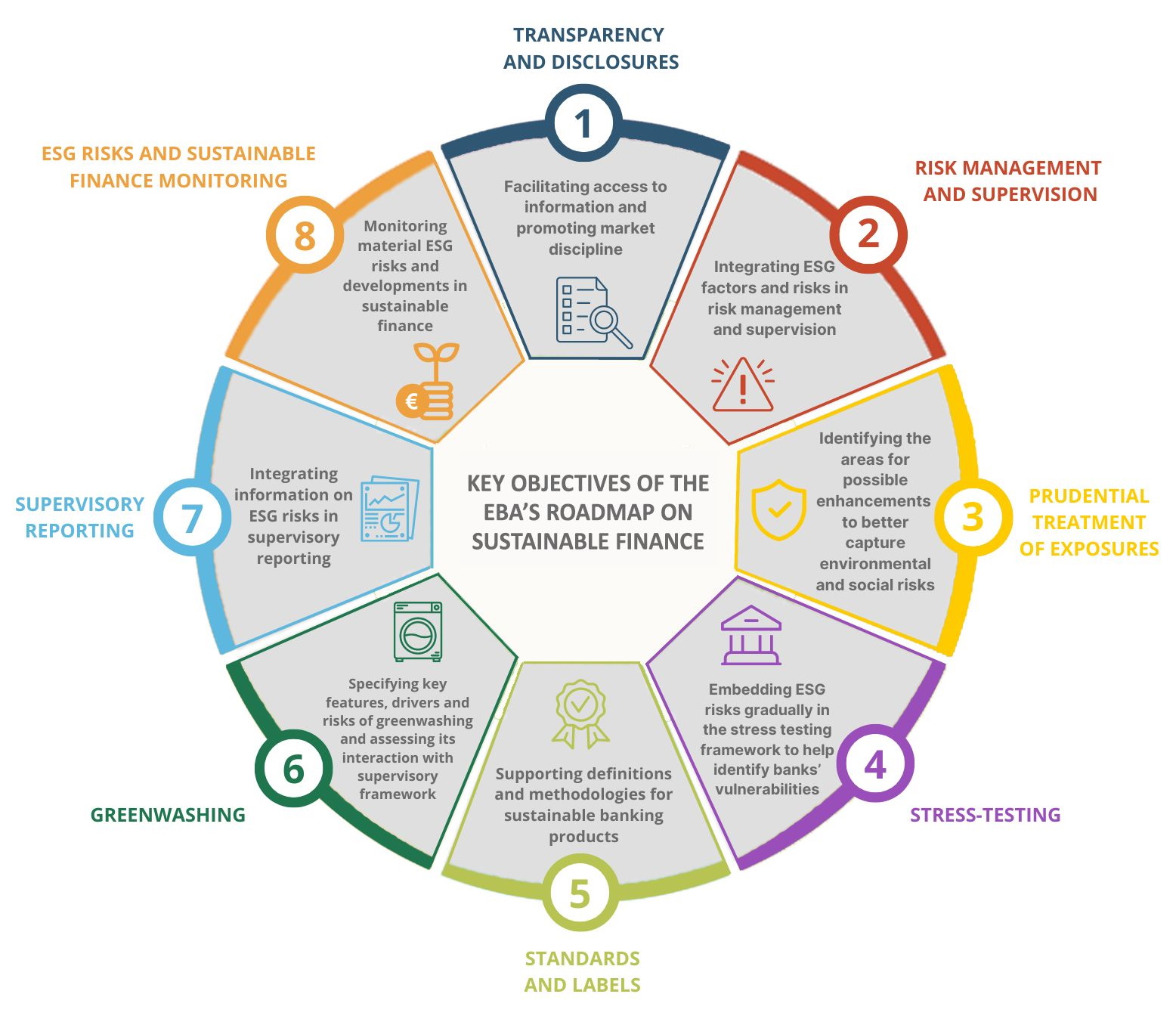By Goran Popcanovski and Joachim Dorschel
Sustainability and ESG have been on the agenda in the financial sector for several years now. Numerous regulatory measures have been implemented in previous years, in particular in the reporting obligations for large institutions. The requirements for sustainable management and reporting have been fine-tuned since the announcement of the Green Deal and the associated Sustainable Finance Strategy.
The following themes are particularly relevant for German financial institutions this year:
7. Amendment to MaRisk
The imminent 7th amendment to the MaRisk requirements defines the regulatory requirements regarding the risks around ESG and sustainability. Financial institutions must therefore ensure that they incorporate sustainability risks into their risk assessment and respective management processes. As part of the EBA (European Banking Authority) stress test, climate risks must now be taken into account for the first time.
In specific terms, this means that:
- Implementation of the EBA guidelines for lending procedures and the monitoring of such
- Comprehensive analysis of ESG risks at all the levels of risk management in an institution
- Implementation in all the relevant risk management processes and systems
The specific timetable for the entry into force and implementation of the amendment is not yet fixed. The implementation in terms of effort is likely to be considerable for many institutions, as ESG introduces a totally new dimension of risk into risk management which will require changes to practically all the relevant processes and systems (cf. our blog post The 7th amendment to the MaRisk – Challenges and opportunities for the business and financial sector).

Key objectives of the EBA’s roadmap on sustainable finance (Source: EBA)
Categorisation and assessment of environmental and climate risks
Efficient and compliant risk management is one of the most important functions for financial institutions. The scope for risk monitoring is expanded with the ECB requirements in terms of managing environmental and climate risks. Financial institutions will therefore have to implement the following requirements in 2023:
- Adequate categorisation and full assessment of the impact of climate and environmental risks for business activities (up to 31 March 2023)
- Sufficient integration of climate and environmental risks into governance, strategy and risk (GSR) management (up to 31 December 2023)
- Implementation of all the requirements stipulated in the “Supervisory requirements on climate and environmental risks” (up to 31 December 2024)
Preparation for the implementation of the CSRD (Corporate Sustainability Reporting Directive)
Financial institutions, similar to companies involved in the capital markets, have been under an obligation to supplement their management report with specific aspects of sustainability and diversity pursuant to the Non-Financial Reporting Directive since 2017. The Corporate Sustainability Reporting Directive (CSRD) significantly extends these obligations. The new reporting requirements will apply to the financial sector from the 2024 financial year.
For 2023, this means:
- Extended reporting obligation of financial institutions in accordance with the Corporate Sustainability Reporting Directive from the 2024 financial year
- In particular: Information on compliance in accordance with Art. 8 EU taxonomy for sustainable activities (Taxonomie-Verordnung)
- Implementation through European Sustainability Reporting Standards (ESRS) anticipated in 2023
- Review and, where necessary, modification of data collection and evaluation to fulfil the reporting obligation.
The challenge here is likely to be in particular the collection and validation of the data required for reporting purposes. The reporting obligation also includes, in particular, information on the sustainability of the business activities of the institution, which assumes that the institution is aware of the key ESG indicators of its clients. Projects for the structured collection and verification of this data are as yet in the early stages.
Implementation of the Regulatory Technical Standards (RTS) on the Sustainable Finance Disclosure Regulation (SFDR)
The Sustainable Finance Disclosure Regulation (SFDR) obliges financial companies to make public specific information on the consideration of sustainability aspects in decision-making processes and in connection with financial products. The ordinance will enter into force in stages, and will be substantiated through regulatory technical standards (RTS).
Decisive RTS guidelines were published by the EU Commission in April 2022. Numerous requirements in terms of content and structuring regarding the SFDR came into force on 1 January 2023. The new regulations will be actively implemented for the first time in 2023.
By 30 June 2023, financial companies must also declare the extent to which investment decisions have an adverse impact on sustainability factors.
The first publication of a comparison of the annual reference periods is then due on 20 June 2024.
Support to corporate clients in sustainability transformation
Both the expansion of risk management to include ESG aspects and the demand for ESG data arising from the reporting obligations are also likely to strengthen, in the medium term, the current trend in many institutions with strong corporate client business to support clients with their own advisory services on their way to sustainability transformation.
The key aspects in this context are:
- A potential deterioration in the risk profile of loan clients with no clear strategy for sustainability
- Negative impact of exposure to non-sustainable clients or activities on the ESG metrics of the institution (e.g. Green Asset Ratio, Banking Book Taxonomy Alignment Ratio).
- Requirement for clients to provide ESG data to fulfil their own ESG obligations
Financial institutions therefore have a high self-interest in motivating the maximum number of corporate clients to adopt a sustainable corporate policy.
Summary
All the aspects of sustainability will continue to be relevant in 2023, and will have an impact in many business sectors. In so doing, innovative institutions can exploit any opportunities that may arise, and position themselves accordingly in the future. They can also build on the successes of their digital transformation.
We at DPS support financial institutions in the implementation of their digital transformation and the regulatory and strategic activities relating to sustainability.











